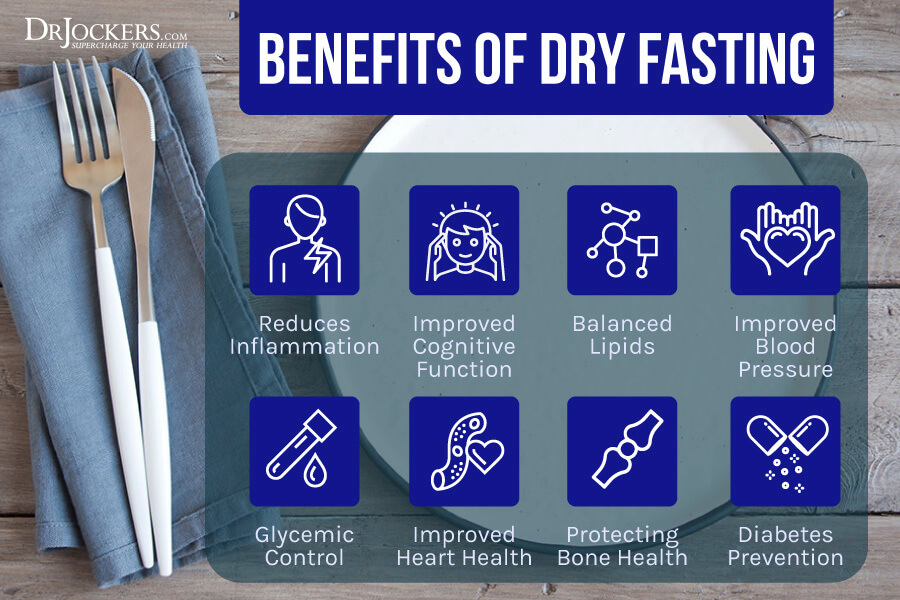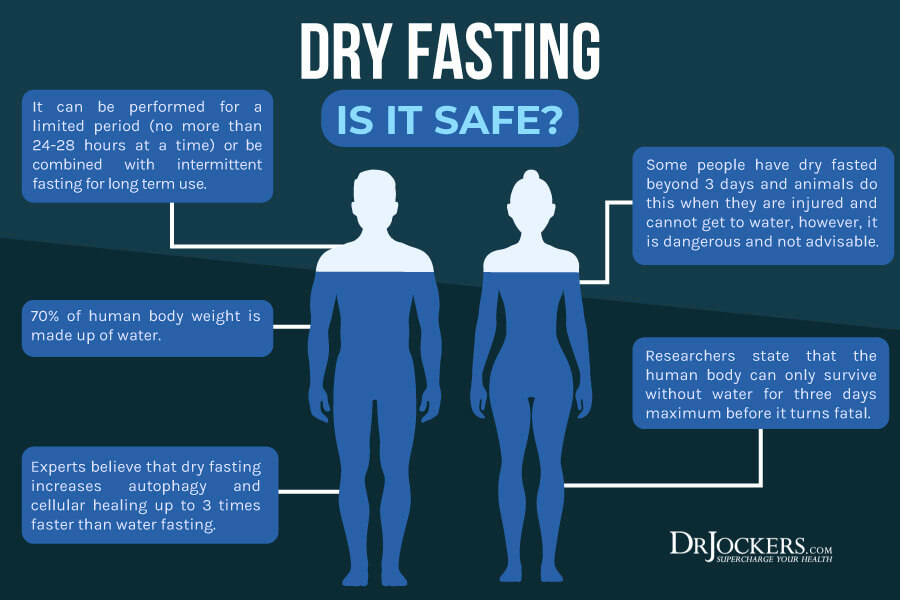Exploring the Health Benefits and Risks of Dry Fasting: A Comprehensive Guide
 Source: drjockers.com
Source: drjockers.com
Introduction to Dry Fasting
What is dry fasting?
Dry fasting is an ancient practice that involves abstaining from both food and water for a specific period of time. Unlike traditional fasting, where individuals may continue to consume water or other liquids, dry fasting restricts any form of hydration. This type of fasting has been practiced for centuries as a method to cleanse the body, promote healing, and improve overall health.
Different types of dry fasting
There are two main types of dry fasting: soft dry fasting and hard dry fasting.
- Soft dry fasting: During soft dry fasting, individuals are allowed to come into contact with water through activities such as showering or washing their face. However, they are not allowed to ingest any water or consume any other form of liquid or food.
- Hard dry fasting: Hard dry fasting is a more extreme form of dry fasting where individuals avoid any contact with water. This means no showering, washing hands, or even brushing teeth during the fasting period.
Both types of dry fasting can be practiced intermittently, where individuals alternate between periods of fasting and regular eating, or for longer durations ranging from a few days to several weeks.
Health benefits of dry fasting
Dry fasting has been associated with several potential health benefits, although more research is needed to fully understand its effects. Some potential benefits include:
- Autophagy: Dry fasting may stimulate autophagy, a process where the body cleanses and removes damaged cells, promoting cellular rejuvenation and overall health.
- Weight loss: Dry fasting can lead to rapid weight loss due to the restriction of calorie intake and the body utilizing stored fat for energy.
- Improved insulin sensitivity: Studies have shown that dry fasting may improve insulin sensitivity, potentially benefiting individuals with insulin resistance or type 2 diabetes.
- Mental clarity: Many people report experiencing improved mental clarity and focus during a dry fast.
Risks and considerations of dry fasting
While dry fasting may have potential health benefits, it is essential to approach this practice with caution and seek guidance from a healthcare professional. Some potential risks and considerations include:
- Dehydration: Dry fasting can lead to severe dehydration, which can be dangerous, especially for individuals with certain medical conditions or those who are not adequately prepared for the fasting period.
- Electrolyte imbalances: Extended periods of dry fasting can disturb the balance of electrolytes in the body, leading to potential complications.
- Nutrient deficiencies: By abstaining from food and water, individuals may not be getting all the necessary nutrients their bodies require, leading to nutrient deficiencies if not properly managed.
- Individual tolerance and health conditions: Dry fasting may not be suitable for everyone, particularly individuals with underlying health conditions, pregnant or breastfeeding women, or those taking certain medications. It is crucial to consult with a healthcare professional before attempting a dry fast.
In conclusion, dry fasting is an ancient practice that involves abstaining from both food and water for a specific period of time. While it may have potential health benefits such as autophagy and weight loss, it is essential to approach dry fasting with caution, seek professional guidance, and be aware of the potential risks and considerations that
 Source: blog.fnp.com
Source: blog.fnp.com
Health Benefits of Dry Fasting
Potential weight loss benefits
Dry fasting has been associated with potential weight loss benefits due to its restriction of calorie intake and the body's utilization of stored fat for energy. When the body is deprived of both food and water, it enters a state of ketosis, where it begins to break down fat for fuel instead of carbohydrates. This process can lead to rapid weight loss, making dry fasting an attractive option for those looking to shed excess pounds.
Improvement in insulin sensitivity
Studies have shown that dry fasting may improve insulin sensitivity, which is particularly beneficial for individuals with insulin resistance or type 2 diabetes. Insulin is a hormone that regulates blood sugar levels, and when the body becomes resistant to its effects, it can lead to diabetes and other metabolic disorders. Dry fasting has been found to help improve the body's sensitivity to insulin, allowing it to effectively regulate blood sugar levels and potentially reduce the risk of developing diabetes.
Promotes autophagy
Another potential health benefit of dry fasting is the stimulation of autophagy. Autophagy is a natural body process where damaged cells are broken down and recycled to create new, healthier cells. This cellular rejuvenation process has been associated with various health benefits, including improved immune function, reduced inflammation, and increased longevity. Dry fasting has been shown to promote autophagy, helping to cleanse the body at a cellular level and support overall health.
Enhanced mental clarity and focus
Many individuals who practice dry fasting report experiencing improved mental clarity and focus. As the body enters a state of ketosis during dry fasting, it starts producing ketones, which can serve as a source of fuel for the brain. Ketones are known to provide a more stable and consistent energy supply compared to carbohydrates. This steady supply of energy can result in heightened mental clarity, improved concentration, and increased cognitive function.
Important considerations and potential risks
While dry fasting may have potential health benefits, it is crucial to approach this practice with caution and under the guidance of a healthcare professional. Some important considerations and potential risks of dry fasting include:
- Dehydration: Dry fasting can lead to severe dehydration, especially for individuals with certain medical conditions or those who are not adequately prepared for the fasting period. It is crucial to stay hydrated before and after a dry fast to minimize the risk of dehydration.
- Electrolyte imbalances: Extended periods of dry fasting can disturb the balance of electrolytes in the body, potentially leading to complications. It is essential to ensure proper electrolyte intake and speak with a healthcare professional about supplementing if necessary.
- Nutrient deficiencies: By abstaining from food and water, individuals may not be getting all the necessary nutrients their bodies require. It is important to properly manage nutrition before and after a dry fast to prevent nutrient deficiencies.
- Individual tolerance and health conditions: Dry fasting may not be suitable for everyone, particularly individuals with underlying health conditions, pregnant or breastfeeding women, or those taking certain medications. It is crucial to consult with a healthcare professional before attempting a dry fast.
In conclusion, dry fasting has the potential to offer several health benefits, including weight loss, improved insulin sensitivity, promotion of autophagy, and enhanced mental clarity. However, it is important to approach dry fasting with caution, seek professional guidance, and be aware of the potential risks and considerations associated with this practice.
 Source: media.post.rvohealth.io
Source: media.post.rvohealth.io
Risks and Precautions of Dry Fasting
Dehydration and electrolyte imbalance
One of the most significant risks of dry fasting is severe dehydration. Without consuming any liquids, the body can quickly lose water, leading to imbalances in electrolytes such as sodium, potassium, and magnesium. These electrolytes are essential for proper bodily function, including nerve and muscle cell communication. Electrolyte imbalances can result in symptoms such as muscle cramps, headaches, dizziness, and even organ dysfunction.
To mitigate the risk of dehydration and electrolyte imbalances, it is crucial to properly hydrate before and after a dry fast. It is recommended to drink plenty of water and electrolyte-rich fluids to replenish the body's water and electrolyte levels. However, individuals with certain medical conditions or those who are not adequately prepared for the fasting period should exercise caution and consult with a healthcare professional before attempting a dry fast.
Potential muscle loss
During a dry fast, the body enters a state of ketosis, where it begins to break down stored fat for energy instead of carbohydrates. While this can lead to weight loss, there is also a risk of muscle loss. The body may utilize muscle proteins as an energy source when no carbohydrates are available. This can be especially concerning for individuals who engage in regular physical activity or rely on muscle strength and mass for their daily activities.
To minimize the risk of muscle loss during a dry fast, it is essential to engage in regular resistance training exercises to maintain muscle strength and mass. Additionally, individuals should ensure they consume an adequate amount of protein before and after the fast to support muscle recovery and growth.
Other considerations and potential risks
In addition to dehydration and potential muscle loss, there are other considerations and potential risks associated with dry fasting. These include:
- Nutrient deficiencies: By abstaining from food and water, individuals may not be obtaining essential nutrients, vitamins, and minerals required for optimal health. It is essential to ensure a well-balanced diet before and after a dry fast to prevent nutrient deficiencies. Consultation with a healthcare professional or a registered dietitian can provide guidance on maintaining adequate nutrition during the fasting period.
- Individual tolerance and health conditions: Dry fasting may not be suitable for everyone, especially individuals with underlying health conditions, pregnant or breastfeeding women, or those taking certain medications. It is crucial to seek medical advice and consult with a healthcare professional before attempting a dry fast to evaluate individual suitability and ensure safety.
- Psychological impact: Fasting, especially for extended periods, can have psychological effects on individuals. It may lead to increased stress, irritability, cravings, or even disordered eating patterns. It is important to approach dry fasting with a mindful and balanced mindset, seeking support from healthcare professionals or mental health experts if needed.
In conclusion, while dry fasting can potentially offer various health benefits, such as weight loss and improved insulin sensitivity, it is essential to exercise caution and be aware of the associated risks and precautions. Dehydration and electrolyte imbalance, potential muscle loss, nutrient deficiencies, and individual suitability should be carefully considered. It is highly recommended to consult with a healthcare professional before embarking on a dry fast to ensure safety
 Source: miro.medium.com
Source: miro.medium.com
How to Safely Incorporate Dry Fasting
Duration and frequency of dry fasting
When it comes to dry fasting, it is crucial to approach it with caution and prioritize safety. The duration and frequency of dry fasting can vary depending on individual health, tolerance, and goals. It is generally recommended to start with shorter periods of fasting and gradually increase the duration as your body becomes accustomed to it.
For beginners, a safe starting point is typically a 24-hour dry fast. This means abstaining from both food and water for a full day. Once you feel comfortable with this duration, you can progress to longer periods, such as 36 or even 48 hours. It is important to listen to your body and pay attention to any signs of discomfort or dehydration during the fasting period.
In terms of frequency, dry fasting should not be practiced continuously or excessively. It is generally recommended to incorporate dry fasting into your routine on an occasional basis. Depending on your goals and individual needs, you may choose to engage in dry fasting once or twice a month, or even less frequently.
Preparing for a dry fast
To ensure a safe and successful dry fast, proper preparation is key. Here are some steps you can take to prepare your body for the fasting period:
- Hydrate adequately: Prior to starting a dry fast, it is important to hydrate your body properly. Ensure that you drink plenty of water in the days leading up to the fast to ensure your body is well-hydrated.
- Gradually reduce food intake: It is recommended to gradually reduce your food intake in the days leading up to the fast. This allows your body to adjust and helps minimize any potential discomfort or hunger pangs during the fasting period.
- Eat a balanced diet: Prioritize a well-balanced diet that is rich in essential nutrients, vitamins, and minerals before the fast. This helps ensure that your body has sufficient reserves to support optimal functioning during the fasting period.
- Consult with a healthcare professional: If you have any underlying health conditions or take medications, it is crucial to consult with a healthcare professional before embarking on a dry fast. They can provide personalized guidance and ensure that dry fasting is safe for you.
- Listen to your body: Throughout the fasting period, it is important to listen to your body and be aware of any potential signs of distress or dehydration. If you experience severe discomfort or symptoms such as dizziness, lightheadedness, or extreme thirst, it may be a sign to break the fast and rehydrate.
Remember, everyone's body is unique, and what works for one person may not work for another. It is important to approach dry fasting with mindfulness and prioritize your health and well-being above all else. If at any point you feel uncertain or uncomfortable, do not hesitate to consult with a healthcare professional for guidance.
By following these guidelines and considering your individual needs and limitations, you can safely incorporate dry fasting into your routine and potentially reap its health benefits. However, it is essential to remember that dry fasting is not suitable for everyone, and it is always best to consult with a healthcare professional before making any significant changes to your diet or fasting practices.
 Source: scx2.b-cdn.net
Source: scx2.b-cdn.net
Common Misconceptions About Dry Fasting
Dispelling Myths About Dry Fasting
Dry fasting, the practice of abstaining from both food and water for a specific period, has gained attention in recent years for its potential health benefits. However, there are several misconceptions surrounding this fasting method that need clarification.
One common misconception is the belief that dry fasting leads to extreme dehydration. While it is true that dry fasting restricts fluid intake, the body has remarkable mechanisms to conserve water during this period. Through a process called autophagy, the body breaks down damaged cells and recycles water within the body. Additionally, during a dry fast, the body enters a state of ketosis, where it utilizes stored fat for energy instead of relying on glucose. This metabolic shift also reduces the need for water.
Another myth is that dry fasting is more effective for weight loss than other fasting methods. While it is true that dry fasting can lead to rapid weight loss, this weight loss is primarily due to water loss and not fat loss. Once you reintroduce fluids and resume a regular diet, the weight lost during a dry fast is likely to be regained.
Addressing Concerns About Adequate Hydration
A common concern associated with dry fasting is the potential for dehydration and electrolyte imbalances. It is essential to note that dry fasting should only be practiced by individuals who are in good health and have consulted with a healthcare professional. However, for those who choose to engage in dry fasting, there are ways to mitigate these concerns.
During the fasting period, it is crucial to listen to your body and pay attention to any signs of dehydration or discomfort. If you experience symptoms such as dizziness, lightheadedness, or extreme thirst, it is important to break the fast and rehydrate immediately. Additionally, before starting a dry fast, it is recommended to hydrate adequately in the days leading up to it to ensure your body has sufficient water reserves.
To further support hydration during a dry fast, one can focus on consuming hydrating foods prior to the fasting period. Foods with high water content, such as fruits and vegetables, can help maintain hydration levels. Additionally, electrolyte-rich foods, such as coconut water or bone broth, can help replenish electrolytes lost during the fasting period.
It is crucial to remember that dry fasting is not suitable for everyone. Individuals with certain medical conditions, such as kidney disease or diabetes, should avoid dry fasting altogether. Furthermore, pregnant or breastfeeding women, as well as individuals with a history of disordered eating, should also refrain from dry fasting.
In conclusion, while dry fasting has gained popularity for its potential health benefits, it is vital to understand the common misconceptions surrounding this fasting method. Dispelling myths about dehydration and addressing concerns about adequate hydration can help individuals make informed decisions about incorporating dry fasting into their routine. As always, it is important to consult with a healthcare professional before engaging in any fasting practices to ensure it is safe and suitable for your
 Source : drjockers.com
Source : drjockers.com
Conclusion
Dry fasting has gained attention in recent years for its potential health benefits, but it is crucial to be aware of the misconceptions and risks associated with this fasting method. By dispelling myths surrounding dehydration and addressing concerns about adequate hydration, individuals can make informed decisions about incorporating dry fasting into their routine. It is always important to consult with a healthcare professional before engaging in any fasting practices to ensure it is safe and suitable for your specific health needs.
Summary of the Health Benefits and Risks of Dry Fasting
Dry fasting has been linked to several potential health benefits, including autophagy, metabolic flexibility, and increased insulin sensitivity. Autophagy is the process by which the body breaks down damaged cells and recycles water within the body. This process can help remove toxins and promote cellular repair. Dry fasting also promotes metabolic flexibility, leading to a shift in the body's primary source of energy from glucose to stored fat. This can be beneficial for weight management and improving insulin sensitivity.
However, it is important to consider the risks associated with dry fasting. Extreme dehydration is a common concern, but the body has mechanisms to conserve water during this fasting period. Nonetheless, it is essential to listen to your body and break the fast if you experience symptoms of dehydration or extreme thirst. Dry fasting is not suitable for everyone, and individuals with certain medical conditions or a history of disordered eating should avoid it altogether.
Consultation with a Healthcare Professional
Before engaging in any fasting practices, it is highly recommended to consult with a healthcare professional. They can assess your health status and provide guidance on whether dry fasting is suitable for you. A healthcare professional can help identify any potential risks and advise on the proper duration and frequency of dry fasting.
Additionally, if you choose to engage in dry fasting, it is essential to stay vigilant about hydration. Adequate hydration in the days leading up to the fast and consuming hydrating foods can help maintain hydration levels. Electrolyte-rich foods, such as coconut water or bone broth, can also help replenish electrolytes lost during the fasting period.
In conclusion, dry fasting can offer potential health benefits, but it is essential to approach it with caution. Understanding the health benefits and risks, as well as consulting with a healthcare professional, is crucial for a safe
